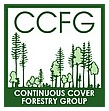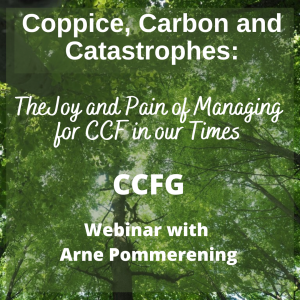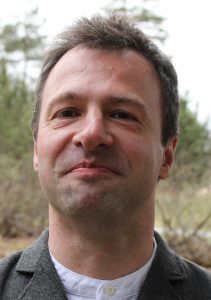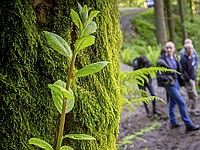
This year’s Scottish CCFG visit is to Trees for Life’s Dundreggan Rewilding Centre to look at the ideas and practices behind the work the organisation’s rewilding project. The 4,000ha estate comprises a mix of remnant Caledonian pine woodland and other native woodland including a significant amount of juniper, a new native woodland and open hill land. Trees for Life also have a native woodland nursery specialising in growing higher altitude species.
The visitor services team have arranged a day visit for us which will look at the nursery and the existing woodland. The challenges of establishing successful native species regeneration with deer pressures and competing vegetation will be a theme common to all foresters. We will be able to see over the native woodland planting but there will not be time to go into it. We will also have a chance to find out more about the approach of Trees for Life, discuss their approach to public engagement and awareness and not forgetting the lessons from the cultural landscape round about.
Trees for Life do make a charge for tours. CCFG will meet part of the cost for members.
To make a booking please use this link
Arrangements
Timings
10.00am – 4.00pm
Please be ready to start at 10am. We will finish by 4pm at the latest.
If you need to be away before 4pm please let Polly know so that you can be on the nursery tour in the afternoon as this is close to the car park.
Meeting point is in the foyer inside the Centre
Charge
There will be a change for this visit which CCFG will partially cover leaving a charge of £15 for members (£5 for students) to be paid in advance. Non-members will be asked to pay the full per head cost of £27.
Site conditions
The walk through the woodland is on a narrow, rough hill path rising to c300m, wet in places. Please wear suitable footwear and clothing. There are alternative lower level surface paths around the Centre if you are unable to do the hill walk which would be self guided.
Biosecurity
As usual please ensure footwear is clean before coming on the visit. This is particularly important because of the nursery element.
Facilities
There is plenty of parking at the Centre
There are also toilets at the centre
Lunch
There is a café at the centre but bringing your own lunch is advised as the café is unlikely to be able to cope with a large demand at lunch time within the time we have allocated. However, it is open between 9.30 and 4.30 so if you arrive early or can stay on then coffee and cake can be purchased.
Booking arrangements
The numbers will be strictly capped to 40 as the tours can only accommodate a maximum of 20 people. We will split into 2 groups for 2 half day tours swapping over at lunch time. One tour looking at the Centre and the Nursery and the other walking in the woods. Places should be booked in advance and are allocated on a first come first serve basis.
If you book and are then unable to come please let Polly (administrator@ccfg.org.uk) know so that the place can be reallocated.



 Continuous Cover Forestry (CCF), i.e. forest management based on ecological principles, has been introduced to Ireland and the UK more than twenty years ago. Whilst in the early days identifying simple and robust methods of transforming plantations to woodlands with more complex structures were the primary concern, ongoing climate change and the recent energy crisis have added new challenges of managing for CCF. Many policymakers including the authors of the recent EU forest strategy and of associated recommendations proposed by the European Forest Institute see CCF as a major instrument for mitigating adverse effects of climate change. In this context, carbon forestry has become a major buzzword and a research field in its own right, however, it is still largely unknown how exactly existing woodlands should be managed for optimising carbon sequestration. Questions like “Is carbon forestry part of or a concept separate from CCF?” or “Can carbon forestry be carried out along with other management objectives or is a special focus required?” are hotly debated. Ongoing climate change and all its localised realisations such as spontaneous gales, droughts, floods and insect calamities can always bring the sudden end to any CCF woodland that we have transformed for many years with great effort. In that situation we may be left with little more than bare ground and methods are needed to establish new CCF
Continuous Cover Forestry (CCF), i.e. forest management based on ecological principles, has been introduced to Ireland and the UK more than twenty years ago. Whilst in the early days identifying simple and robust methods of transforming plantations to woodlands with more complex structures were the primary concern, ongoing climate change and the recent energy crisis have added new challenges of managing for CCF. Many policymakers including the authors of the recent EU forest strategy and of associated recommendations proposed by the European Forest Institute see CCF as a major instrument for mitigating adverse effects of climate change. In this context, carbon forestry has become a major buzzword and a research field in its own right, however, it is still largely unknown how exactly existing woodlands should be managed for optimising carbon sequestration. Questions like “Is carbon forestry part of or a concept separate from CCF?” or “Can carbon forestry be carried out along with other management objectives or is a special focus required?” are hotly debated. Ongoing climate change and all its localised realisations such as spontaneous gales, droughts, floods and insect calamities can always bring the sudden end to any CCF woodland that we have transformed for many years with great effort. In that situation we may be left with little more than bare ground and methods are needed to establish new CCF woodlands from scratch. CCF from scratch may also include the use of coppice systems, particularly the use of coppice with standards and coppice selection systems. Such system can contribute to satisfying the current demand for sustainable energy whilst creating diverse habitats and providing high-quality timber at the same time.
woodlands from scratch. CCF from scratch may also include the use of coppice systems, particularly the use of coppice with standards and coppice selection systems. Such system can contribute to satisfying the current demand for sustainable energy whilst creating diverse habitats and providing high-quality timber at the same time.







